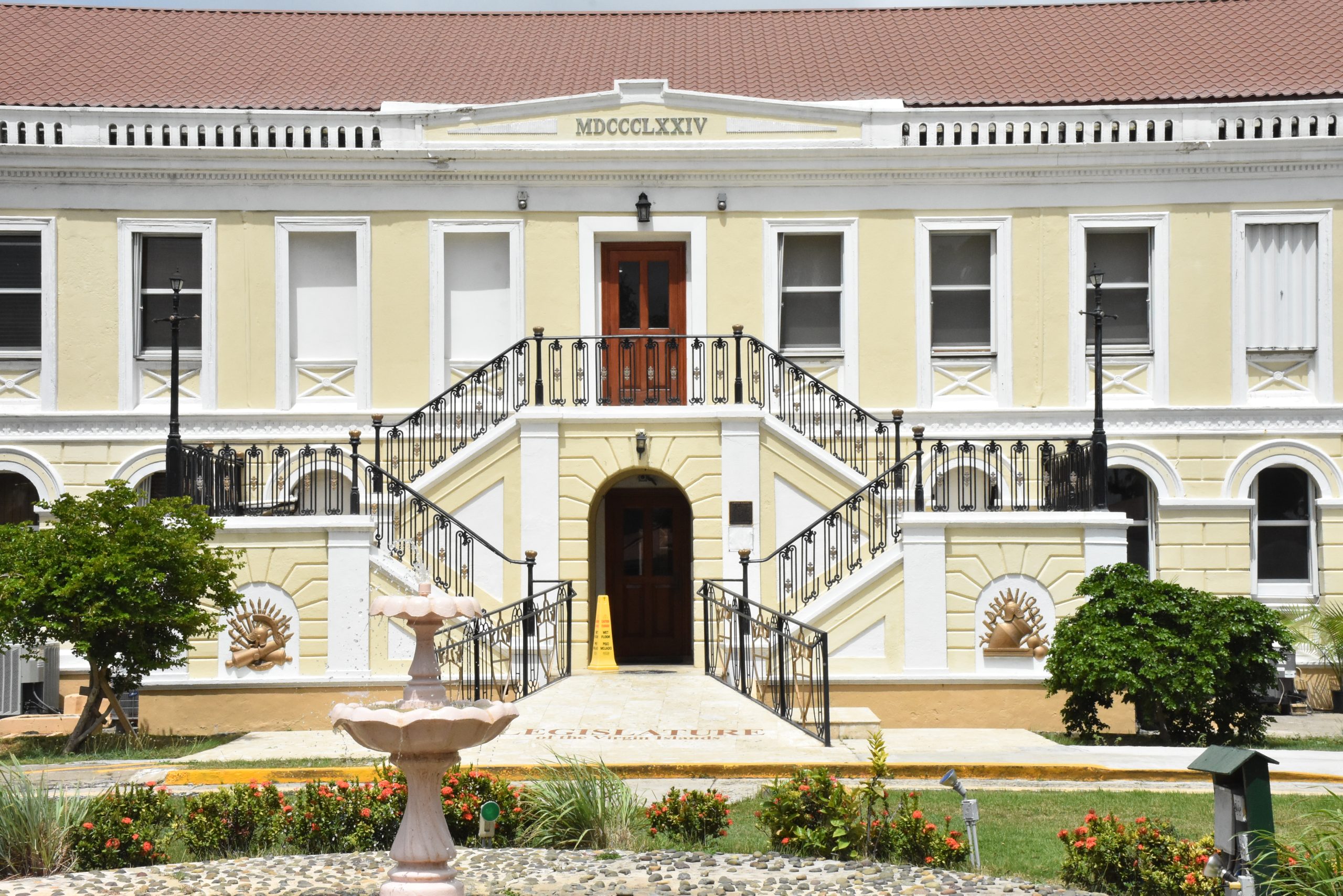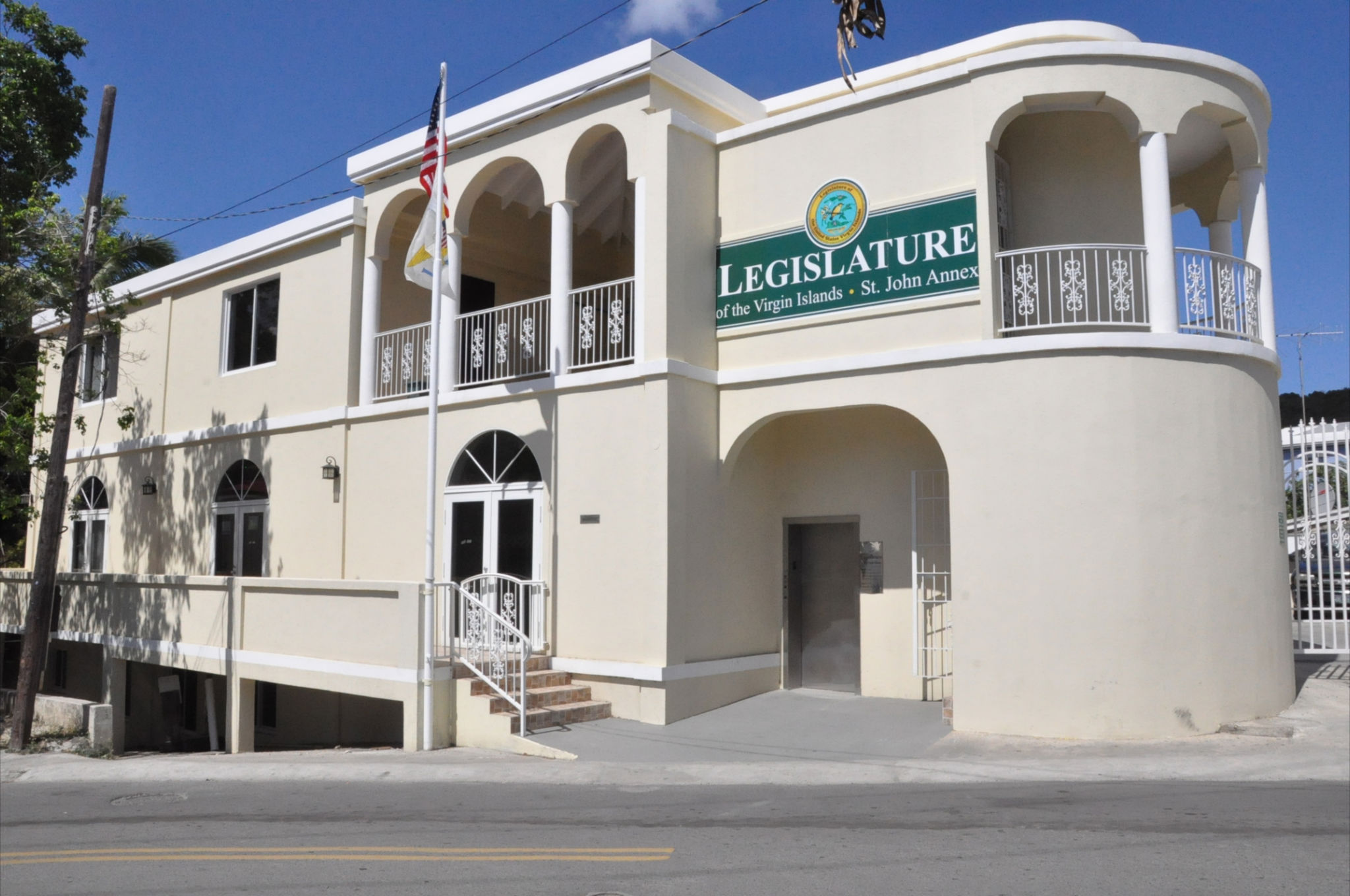Functions and Structure
Functions and Structure of the Legislature
of
the United States Virgin Islands
The Legislature is one of three co-equal branches of the Government of the Virgin Islands of the United States, with its own powers delegated by the Revised Organic Act of 1954, passed by the U.S. Congress, which established our local government. The other two branches are the Executive Branch, which is headed by the Governor and is responsible for administering the laws passed by the Legislature; and the Courts usually called the Judiciary, which interprets the laws passed. The Senators are elected representatives of the people and pass the laws for the people of the Virgin Islands, subject to the veto power of the Governor. These laws must not be in conflict with any federal rule or law, or in violation of the Constitution of the United States. The Legislature organizes Committees to plan ways in which the various departments of the Government can operate more effectively. When a new law or resolution is proposed, it is first written up as a “Bill,†introduced into the Legislature, and given a number, and assigned to a Committee. After the Bill is discussed by the various committees concerned with its content, it is sent to the floor of the Legislature, voted upon by the fifteen Senators, and if passed by a majority of Senators present and voting, it is sent to the Governor for his signature. When the Governor signs the Bill, it then becomes an “Act†or law of the Virgin Islands Government and will be put into effect. If the Governor vetoes the bill, the Senators can override the veto by a two-thirds vote of the fifteen-member body. The Legislature may convene in Special Sessions called by the President of the Legislature, by petition to the office of the President of the Legislature signed by a majority of the Senators, or by the Governor of the Virgin Islands.
The legislative power and authority of the Virgin Islands, created by Section 5-A of the Revised Organic Act of the Virgin Islands approved July 22, 1954, as amended, is vested in a legislature consisting of one house, designed as the “Legislature of the Virgin Islands.†Annually, on the second Monday in January, the Legislature convenes in Regular Session. In addition to its lawmaking functions, the Legislature performs functions which include fact-finding and similar investigations, receiving and considering requests or petitions from groups and individuals confirming certain officers appointed by the Governor, and exercising quasi-judicial authority to punish in cases of certain offenses against the Legislature or its members.
The Legislature is composed of fifteen Senators, who serve for two-year terms. It adopts its own rules of procedure, establishes standing committees, maintains its own records, and elects its own officers. The presiding officer of the Legislature is the President of the Senate. To be eligible to serve as a member of the Legislature, a person must have attained the age of twenty-one years, be a U.S. citizen, be a resident of the Territory for not less than three years, and be a qualified voter of the district from which election is sought. Leadership The leadership of the Legislature consists of the following officers: President, Vice- President, Legislative Secretary, Majority Floor Leader, White House Liaison, and Minority Leader. These officers, with the exception of the Minority Leader, are selected by majority vote at the convening of a new legislature. President of the Legislature: The presiding officer of the Legislature whose functions include chairing the sessions of the Legislature, maintaining order in the chamber, appointing members of all committees and designating the chairpersons, appointing legislative employees, and other duties required by law or by the rules of the Legislature. Vice President: Performs the duties of the President in his absence. Legislative Secretary: Duties include calling the roll of members, recording the presence or absence of a quorum, and transmitting bills passed by the Legislature to the Governor. Office of the Executive Director The Executive Director is central to the administration and functioning of everyday legislative business. The Director is responsible for the daily administration of the legislative offices on all three islands and is assisted on St. Croix by a full-time Assistant Executive Director.
All bills, legislation initiated by the Governor, zoning change petitions, commendatory resolutions, and formal correspondence pass through the Office of the Executive Director before reaching the floor of the Senate. Acting as a clerk on the floor, the Executive Director reads all bills, resolutions, and correspondence, and conducts all votes put to a roll call. Additionally, the Executive Director is responsible for the printing and distribution of bills, acts, journals, and other official documents; the preservation of legislative records; and the supervision of all employees who may be assigned to this office by the President of the Senate.
Business and Financial Management
The Office of Business and Financial Management is responsible for computing payroll, per diem, and expense reimbursements for each Senator and employee. The office acts as a purchasing clearinghouse for all items approved by the Executive Director or the Senate President, and performs all legislative bookkeeping and accounting functions as well as compiling and maintaining all fiscal records.
Business and Financial Management
The Office of Business and Financial Management is responsible for computing payroll, per diem, and expense reimbursements for each Senator and employee. The office acts as a purchasing clearinghouse for all items approved by the Executive Director or the Senate President, and performs all legislative bookkeeping and accounting functions as well as compiling and maintaining all fiscal records.
Facilities Management
The duties of the Director of Facilities Management are as follows:(a) to supervise a maintenance and construction staff of persons qualified and trained in building repairs, maintenance, and construction;(b) to prepare estimates of materials and labor costs for repairs and construction work to be done on offices and buildings of the Legislature;(c) to inspect work performed in the various offices of the Legislature by private contractors in plumbing, painting, repairs, electrical and other work; and(d) to prepare reports to the President on the condition of the various offices of the legislature in St. Thomas, St. Croix, and St. John.
Journal Division
The Journal Section is responsible for typing, printing, and distributing all legislative bills and journals. The Journal Section maintains a bill register, which records each bill, along with its sponsors, committee assignments, and dates of introduction, report to the floor, and adoption, veto, and subsequent action. At the end of each year, the Journal Section prepares a complete resume on each piece of legislation introduced, which is then submitted, to the Lieutenant Governor’s Office for printing into the Session Laws and subsequent codification.
Legal Counsel
Your content goes here. Edit or remove this text inline or in the module Content settings. You can also style every aspect of this content in the module Design settings and even apply custom CSS to this text in the module Advanced settings.
Legislative Archives
Legislative Archives, headed by a records analyst, is responsible for the effective organizing of documents, and for storing records, and all other legislative reference materials. In addition, Archives works in concert with the Legislative Library, which is under the jurisdiction of the Legal Counsel’s Office, giving that office maximum research capability.ÂÂ
Legislative Reporters
The Chief Recording Secretary shall be the Chief Recording officer of the Legislature. The duties of the Chief Recording Secretary are as follows:(a) to record and transcribe verbatim each meeting of the Legislature, and to provide a copy of the verbatim transcript to each member of The legislature, the Executive Director, and the Chief Legal Counsel upon request.(b) to record and transcribe verbatim any meeting of a Committee of the Legislature when directed to do so by the President of his or her designee;(c) to cooperate with the Executive Director in providing members of the Legislature and their staffs with documents which may be transcribed by the Recording Secretary or his assigns.
Post Audit Division
The Division of Post Audit is attached to the Legislative Standing Committee on Finance. The Post Auditor monitors the financial affairs and transactions of every department or agency of the executive, legislative, and judicial branches of government. Post audits are made to discover any evidence of unauthorized, illegal, irregular, or unsafe handling or expenditure of funds.
Public Affairs
Your content goes here. Edit or remove this text inline or in the module Content settings. You can also style every aspect of this content in the module Design settings and even apply custom CSS to this text in the module Advanced settings.
Sergeant-at-Arms
Section 405. The duties of the Sergeant-at-Arms are as follows:(a) to attend the Legislature during all of its sittings and to execute the commands of the Legislature, together with all such processes issued by authority thereof as shall be directed to him by the President; (b) to enforce strictly these Rules as they relate to order and decorum in the Legislative Chambers; (c) if directed, to establish a quorum at each meeting of the Legislature as provided in Section 205 (c) of these Rules; and(d) to perform such other duties as may be prescribed by the President and to supervise such employees as may be assigned by the President to assist with these duties. The Sergeant-at-Arms is authorized to arrest for contempt all persons in the Gallery found in loud conversation or otherwise disturbing the proceedings of the Legislature.





